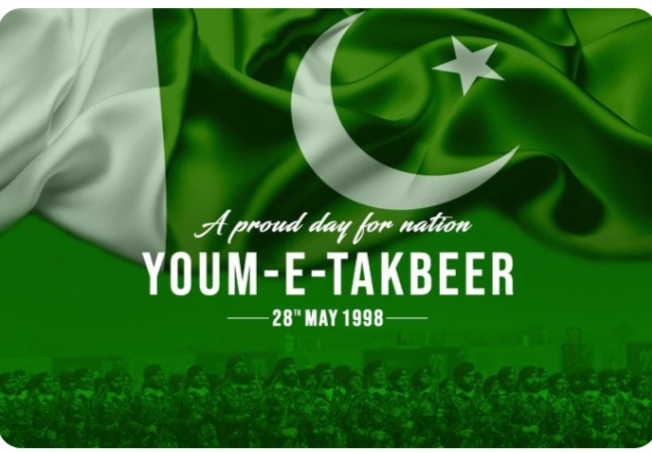Youm-e-Takbeer: A Tribute to Pakistan’s Scientific Excellence and National Security
Dr. Muhammad Shahzad Ashfaq
Postdoctoral Fellow
International Islamic University Islamabad, Pakistan
Youm-e-Takbeer celebrated on May 28 every year, holds great significance in the history of Pakistan as it marks the day when Pakistan became the first Muslim nuclear power in the world. This day is a tribute to Pakistan’s scientific excellence and national security, as it displays the country’s capabilities in the field of nuclear technology. The journey towards this monumental achievement began in the early 1970s when Pakistan started its nuclear program with the goal of ensuring its national security and sovereignty. Despite facing numerous challenges and obstacles, Pakistan’s scientists and engineers worked tirelessly to develop the necessary infrastructure and expertise to build a nuclear arsenal. The culmination of these efforts came on May 28, 1998, when Pakistan conducted a series of nuclear tests in the Chagai district of Balochistan. These tests demonstrated Pakistan’s ability to produce nuclear weapons and served as a deterrent against potential threats to its security. The successful nuclear tests on Youm-e-Takbeer were a result of the hard work and dedication of Pakistani scientists and engineers, who worked tirelessly to develop the country’s nuclear capabilities.
Despite facing international pressure and sanctions, Pakistan refused to compromise on its national security and took a bold step to ensure its defense against external threats. The tests were a testament to Pakistan’s scientific excellence and technological prowess, displaying the country’s ability to innovate and achieve breakthroughs in the field of nuclear technology. It represents a turning point in Pakistan’s history, where the country asserted its status as a responsible nuclear power and demonstrated its commitment to peace and stability in the region. The day serves as a reminder of the importance of maintaining a strong and credible defense capability, while also emphasizing the need for diplomacy and dialogue to prevent conflict and promote cooperation among nations.
Youm-e-Takbeer is not just a day of celebration, but also a reminder of the sacrifices and dedication of the scientists and engineers who made Pakistan’s nuclear program a reality. These individuals worked under immense pressure and with limited resources to achieve a goal that was crucial for the country’s security and sovereignty. The importance of Pakistan’s nuclear capability as it serves as a deterrent against external threats and ensures the country’s defense and security. The nuclear tests of 1998 sent a strong message to the world that Pakistan was capable of defending itself against any aggression and would not compromise on its national interests.
On this day, Pakistanis also remember the leadership of then-Prime Minister Nawaz Sharif, who took the bold decision to conduct the nuclear tests despite international pressure and sanctions. His vision and determination paved the way for Pakistan to become a nuclear power and ensured the security and sovereignty of the country.
Sharif’s vision for a nuclear-armed Pakistan was rooted in the belief that it was necessary for national security and deterrence against potential threats. He understood the geopolitical realities of the region and saw nuclear weapons as a means to ensure Pakistan’s sovereignty and integrity in the face of external aggression. In the early 1990s, Sharif inherited a nuclear program that was already well underway, thanks to the efforts of his predecessor, Benazir Bhutto. However, it was under Sharif’s leadership that the program reached its zenith. He provided unwavering support and resources to the scientists and engineers working on the project, despite mounting international pressure and sanctions. Sharif’s determination to make Pakistan a nuclear power was evident in his handling of the 1998 nuclear tests.
In response to India’s nuclear tests, Sharif made the bold decision to conduct tests of Pakistan’s own nuclear weapons. This move, while controversial and condemned by the international community, solidified Pakistan’s status as a nuclear-armed state. Sharif’s leadership during this critical moment in Pakistan’s history demonstrated his unwavering commitment to national security and sovereignty. Despite facing immense pressure and criticism, he stood firm in his decision to make Pakistan a nuclear power, knowing that it was essential for the country’s survival and security.
Nawaz Sharif’s vision and determination were instrumental in making Pakistan a nuclear power. It is a tribute to the country’s commitment to defend its sovereignty and protect its people, and it serves as a reminder of the importance of maintaining a strong defense capability in a volatile world. As Pakistan continues to face challenges and threats to its security, Youm-e-Takbeer reminds us of the sacrifices made by the nation to ensure its survival and prosperity. It is a day to honor the courage and resilience of the Pakistani people, and to reaffirm our resolve to defend our homeland against any form of aggression. This day serves as a tribute to the leadership and vision of Nawaz Sharif and all those who contributed to making Pakistan a nuclear power.



